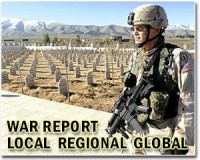 |
Mogadishu, Somalia (UPI) Sep 28, 2010 A mysterious helicopter attack on a gathering of Islamist leaders suggests that the United States, using either Special Forces or mercenaries, may be trying to decapitate jihadist forces who are escalating a war to topple the Western-backed government. The Americans, ever mindful of the casualties the U.S. Army suffered at the hands of Somali militias in Operation Restore Hope in October 1993, are wary of deploying boots on the ground in Somalia to aid the Transitional Federal Government besieged in the seaside capital of Mogadishu. But they have carried out several attacks using missiles, airstrikes and Special Forces since the Islamist movement known as al-Shabaab, or Youth, emerged in December 2006 after U.S.-backed Ethiopian forces toppled an Islamist regime in Mogadishu and established the TFG. U.S. SEALs aboard helicopters from a U.S. warship in the Indian Ocean, ambushed a convoy carrying Saleh Ali Nabhan, al-Shebaab's military commander and a close associate of al-Qaida's top operative in East Africa, Fazul Abdullah Mohammed, in southern Somalia Sept. 14, 2009. The Kenyan-born Saleh was killed and the commandos landed to take his body with them for identification. Fazul is the alleged mastermind of the twin al-Qaida bombings of the U.S. embassies in Kenya and Tanzania Aug. 7, 1998, in which 242 people, 12 of them Americans, died. Nabhan was one of his closest associates. Fazul, who has a $5 million U.S. bounty on his head, was reported to have moved to Somalia earlier this year. On Sunday, an unidentified foreign military helicopter, flying in from the sea, fired rockets into a house in the Shabaab-held coastal town of Merca, witnesses said. Merca, 50 miles southwest of Mogadishu, is near where Saleh was assassinated. At least seven al-Shabaab leaders were gathered in the house but none was reported harmed since the missiles narrowly missed them. The helicopter, painted gray or olive green, flew off when al-Shabaab fighters opened fire on it, witnesses reported. The U.S. military's Special Operations Command in Africa, and the U.S. Africa Command in Stuttgart, Germany, denied any involvement in Sunday's incident. So did officials of the EU naval force battling Somali pirates in the Gulf of Aden. Al-Shabaab unleashed its relentless offensive Aug. 23. The fighting has centered on the ever-shrinking seaside zone controlled by the TFG and a 7,000-strong African Union peacekeeping force that provides most of the firepower for President Sheik Sharif Sheik Ahmed's shaky administration. Officials with Western aid groups estimate that 350 people have been killed in Mogadishu, with another 450 wounded and 23,000 displaced in the ongoing offensive. All told, the catastrophe in Somalia, which has been wracked by clan warfare since the overthrow of dictator Mohammed Siad Barre in 1991, has produced more than 614,000 refugees with an estimated 1.4 million displaced. Al-Shabaab has been joined in the offensive by another Islamist faction, Hezb-ul Islam, a onetime rival that has switched sides before. The TFG suffered another major setback Sept. 21 when Prime Minister Omar Abirashid Ali Sharmarke resigned after a rancorous dispute with Sheik Sharif over a new constitution. They had been feuding for months and Sheik Sharif has been plotting to oust him through a vote of no-confidence since May. Sharmarke, whose father was president until he was assassinated in 1969, said he was quitting "for the sake of my nation's survival." But political insiders said he sought to avoid "becoming a scapegoat for the country's deteriorating situation." The TFG was weakened further by the defection of a moderate Islamist militia, Ahlu Sunna Wal Jamaa, that had joined forces with it several months ago. The president declared Saturday that al-Shabaab seeks to turn Somalia into a base for al-Qaida from which to terrorize the Horn of Africa. That appeared to be a ploy to secure greater international support. But given his government's failure to co-opt opposition groups into a unity administration, Sheik Sharif's Western backers are unlikely to come to his aid. U.N. and aid officials say large numbers of jihadists from Pakistan and Afghanistan have been moving to Somalia to expand the war, as evidenced by two deadly bombings July 11 in Kampala, capital of Uganda which is a key contributor to the AU peacekeeping force. Seventy people were killed.
Share This Article With Planet Earth
Related Links
 Syria hails 'constructive dialogue' despite US warnings
Syria hails 'constructive dialogue' despite US warningsDamascus (AFP) Sept 28, 2010 Syria on Tuesday hailed its "constructive dialogue" with the United States after US Secretary of State Hillary Clinton met her Syrian counterpart Walid Muallem in New York and warned Damascus not to undermine stability in Iraq or Lebanon. "The secretary was very direct and making clear, both in the context of Lebanon and Iraq, that we discourage any efforts to undermine the stability of eith ... read more |
|
| The content herein, unless otherwise known to be public domain, are Copyright 1995-2010 - SpaceDaily. AFP and UPI Wire Stories are copyright Agence France-Presse and United Press International. ESA Portal Reports are copyright European Space Agency. All NASA sourced material is public domain. Additional copyrights may apply in whole or part to other bona fide parties. Advertising does not imply endorsement,agreement or approval of any opinions, statements or information provided by SpaceDaily on any Web page published or hosted by SpaceDaily. Privacy Statement |